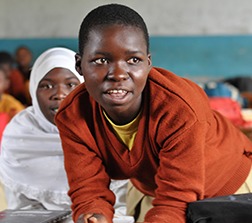- About
- Topics
- Story
- In-Depth
- Picks
- Opinion
- News
- Donate
- Signup for our newsletterOur Editors' Best Picks.Send
Read, Debate: Engage.
| July 09, 2020 | |
|---|---|
| topic: | Child rights |
| tags: | #Sahel, #education, #child brides, #Al Qaeda |
| located: | Burkina Faso, Cameroon, Chad, Democratic Republic of the Congo, Mali, Niger, Nigeria |
| by: | Bob Koigi |
The armed militia groups, majority affiliated to ISIL and Al Qaeda, have also been opposed to any education save for Arabic and the teaching of Qur’an. To entrench their beliefs, they have applied torture, terror, plunder and arson with the situation now classified as unprecedented and highly worrying.
UNICEF in its child alert brief last year sounded the alarm indicating that over one quarter of the 742 reported attacks on schools word over in 2018 happened in five countries within East and Central Africa.
By June last year more than 9,200 schools had been closed in eight countries due to insecurity, three times more than the number recorded by end of 2017.
“Right now, nearly two million children are being robbed of an education in the region due to violence and insecurity in and around their schools. In Burkina Faso, Cameroon, the Central African Republic, Chad, the Democratic Republic of the Congo, Mali, Niger and Nigeria, a surge in threats and attacks against students, teachers and schools – on education itself – is casting a foreboding shadow upon children, their families, their communities and society at large,” read the UNICEF alert.
As the militia groups attack Western education, girls face mounting danger of being forced into child marriages, domestic violence and early pregnancies. Many have been captured as child brides.
Burkina Faso one of the countries in the Sahel that has borne the brunt of the militia group attacks on education has seen the situation degenerate into a crisis of unparalleled proportions. In March this year more than 2,500 schools had been closed as insecurity spread disrupting the lives of 350,000 students and 11,000 teachers according to the ministry of education. The ministry in May said that by late April about 222 education workers had been victims of terrorist attacks.
Between January and April this year, the figures of those displaced by the conflicts from their homes had risen from 87,000 to more than 830,000, the United Nations said.
According to a report by Human Rights Watch dubbed Their War Against Education, the attacks have targeted teachers, students and their parents with teachers being kidnapped, tortured or killed in front of their students in what has had serious psychological impact on the children.
“During attacks, armed men killed, beat, abducted, and threatened education workers; intimidated and threatened students; set classrooms, offices, and teachers’ residences on fire; shot at windows, doors, walls and roofs; set off explosives; burned school documents and academic materials; stole, damaged, or destroyed school employees’ property; and pillaged supplies from canteen warehouses and storerooms,” the report noted.
While there hasn’t been a direct attack on children, there has been instances where they have been caught in the crossfire leading to their death. In one instance in January, seven school children on their way from a break were killed by an explosive that detonated under a public bus. Another student died from a stray bullet in an attack that was happening near his school.
With the conflict escalating and taking dangerous dimensions, the lives of children increasingly remain exposed and threatened as does their education and a promise of a better future. Industry players are now calling on international organisations and governments to ensure the right of children to education as envisioned in the Convention on the Rights of the Child is upheld through collaboration in enhancing security and protection of the children in the Sahel.
“In an increasingly complex region confronted by conflict and instability, education can never be optional. Children must be provided with the opportunity to acquire the skills, knowledge, values and attitudes they need to become responsible, active and productive adults,” UNICEF further said.
By copying the embed code below, you agree to adhere to our republishing guidelines.

